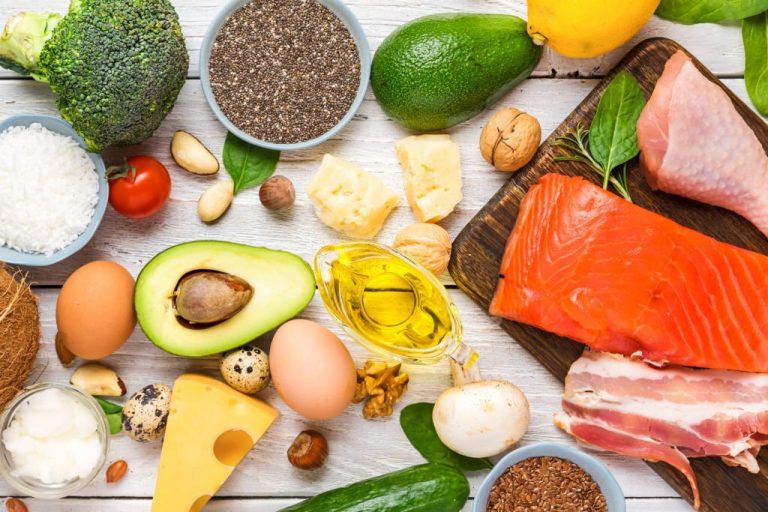High fat, low carb, and high protein make up the ketogenic diet. The ketogenic diet has become very popular over the last few years and for good reason: it leads to weight loss, reduces the risk of chronic diseases, improves cognitive performance, and makes you feel satiated for a longer period of time. What’s more, the ketogenic diet is easy to follow regardless of where you live.
So, if you’re ready to ditch the unhealthy diet you’ve been sticking to and finally start feeling the amazing benefits of a low-carb lifestyle, read on for a detailed guide on how the ketogenic diet works, and the benefits of a low-carb lifestyle.
What is a Ketogenic Diet?
In recent years, the ketogenic diet has grown in popularity as a low-carb diet. With its growing popularity comes a high level of misinformation; so, let’s clear up some of the most common myths surrounding the ketogenic diet and make sure you’re getting the right information to make the right decision for your health.
The ketogenic diet consists of a high consumption of healthy fats and a low consumption of carbohydrates. The ketogenic diet is based on the idea that if you eliminate carbs from your diet, your body will automatically turn to burn fat as fuel. This is known as ketosis.

The diet has been proven to help promote weight loss, improve cognitive performance and reduce the risk of chronic diseases like type 2 diabetes and cancer.
These benefits come from the high intake of healthy fats, which are low in carbohydrate foods. In addition, the high intake of healthy fats like omega-3 fatty acids, vitamin A, vitamin E, minerals, and antioxidants help to improve the functions of our bodies by increasing energy levels and decreasing inflammation.
How Does the Ketogenic Diet Work?
There are many factors that must be in place for the ketogenic diet to work. The diet’s macronutrients, protein, fat, and carbohydrate intake must be in balance.
Maintaining muscle mass while reducing inflammation and oxidative damage requires a sufficient amount of protein. Carbohydrate intake must be low enough to avoid having the body enter a “ketoacidosis” state, which can cause an accumulation of acid in the blood, causing a number of serious health issues.
The ideal carb intake is 20 grams for every 1 kg of your body. Fat intake should be moderate enough to avoid raising cholesterol and risk of chronic diseases, yet low enough to decrease inflammation.
How to Start the Ketogenic Diet
One of the first things you’ll want to do when you’re planning on following a ketogenic diet is to consult a doctor.
The doctor can perform tests to ensure that you have no underlying conditions that would prevent you from following the diet safely.
The ketogenic diet is not for everyone. It can cause a massive dip in blood sugar levels and is only recommended for people who have been diagnosed with type 2 diabetes or epilepsy.
If you’re healthy enough to stick to a low-carb diet, there’s no reason to think you can’t. However, if the thought of cutting out carbs sounds too extreme, then don’t do it.
We’re here to tell you that it’s safe to cut back on carbohydrates and reap all the benefits of a low-carb lifestyle.
Can you maintain a low-carb diet long-term?
The ketogenic diet is a very restrictive diet that limits the number of calories you consume each day. That being said, the ketogenic diet is extremely effective at weight loss.
In fact, research shows that it can be used to help people lose weight in the long term.
As long as the ketogenic diet is followed properly, it can be used for a long period of time. Despite its many benefits, the ketogenic diet has some drawbacks. First of all, it’s quite restrictive.
On the ketogenic diet, you can only eat 20 grams of carbs for every kilogram of your body weight. That’s pretty low, so you may end up cutting out a lot of foods that you like to enjoy.
The other downside is that it’s difficult to get all the nutrients you need from a diet so low in carbs.
Can the Ketogenic Diet make you gain weight?
The ketogenic diet isn’t supposed to lead to weight gain. Dieters on the ketogenic diet stick to a low-carb, high-fat, protein-rich diet.
When you take in a sufficient amount of healthy fats and protein, your body is supposed to start breaking down excess body fat. The ketogenic diet won’t make you gain weight.
According to recent findings, the ketogenic diet may aid in weight loss.
There is one possible pitfall that dieters may fall into when on a ketogenic diet; however, this isn’t something that most people experience with the diet.
Ketogenic diets, for example, typically have higher protein intakes than other types of diets. Protein is important for building muscle and maintaining muscle when losing weight,
so if you’re on a diet high in protein, it’s recommended that you supplement with a source of protein when needed.
How Often Should You Follow the Diet?
The ketogenic diet is only recommended to be followed for short periods of time. Studies have found that the diet is effective in promoting weight loss, but it’s not sustainable.
While it’s possible to follow the ketogenic diet for a long time, it’s not ideal. The ketogenic diet should only be followed for a short period of time in order to achieve the best outcomes.
The study of the ketogenic diet concluded that it was only effective at promoting weight loss for a period of time.
In fact, researchers found that the ketogenic diet was likely to slow down your metabolism and cause you to gain weight if followed for a long time.
Therefore, it’s recommended that you follow the diet for short periods of time and then slowly transition back to your regular diet once you’ve reached your goal weight.
The Best Keto Foods to Eat
Nutritional ketosis is brought on by a low-carb diet. This means that the foods you’re eating will be high in fat, low in carbs and protein, and extremely low in sugar.

If you’re looking for the best keto foods, here are a few low-carb options that you may want to try:
– Fatty Meats – Beef, Lamb, Buffalo, and other fatty meats are a staple in the keto diet and provide high amounts of protein and medium levels of healthy fats.
– Avocado – Not only do avocados contain monosaturated fats that improve blood flow and digestion, but they’re also very low in carbohydrates. A single avocado contains only a small amount of carbs – around 10 grams. That’s less than 1% of your daily carbs – so it’s a great option for a keto diet.
– Eggs – One of the most versatile foods around, eggs are a great protein source that also offers medium levels of healthy fats. One egg contains around 6 grams of protein and only 1 gram of carbs.
– Low-carb veggies – Bell peppers, tomatoes, spinach, artichokes, okra, onions, mushrooms, celery, and many other vegetables contain low amounts of carbs and a rich source of vitamins and minerals.
– Olive oil – An extra-virgin olive oil can help you feel full for longer, which is great for weight loss.
– Healthy fats – A healthy fat like olive oil, coconut oil or avocado can make your meals taste better and give you more energy as long as you don’t overdo it.
– Fruits – Bananas, apples, and watermelon are great keto-friendly fruits that provide a lot of vitamins and minerals, as well as a low amount of carbs.
The Basic Keto Diet Meal Plan
While the ketogenic diet involves a lot of planning, it doesn’t have to be a lot of work to follow. You’ll only need to plan a few meals a day. For example, you could have breakfast, lunch, dinner, and a snack.
Breakfast – This meal can be anything that keeps you full for a longer period of time. A good keto breakfast would be eggs with an avocado and some low-carb veggies such as broccoli or spinach.
Lunch – The lunch portion of your ketogenic diet meal plan should be high in protein. Make sure you include a source of healthy fat like olive oil.
For dinners, you can either choose to eat a high-fat keto meal or have a light snack consisting of non-starchy veggies
Is the Ketogenic Diet Safe?
Yes, the ketogenic diet is not only safe, but it’s actually very beneficial for the body. It may cause a change in the primary energy source of your body, but this change is a good thing because it leads to improved cognitive function, a reduction in disease risk, and a decrease in body fat.
The diet reduces the number of carbohydrates and sugars that the body enters into a state of insulin resistance. When the pancreas produces too much insulin, it leads to insulin resistance.
Over time, this insulin overproduction leads to an inability to regulate blood sugar levels due to which the body suffers from constant hunger pangs. This hunger is often satisfied by eating food that contains a lot of carbohydrates and sugars.
On a ketogenic diet, the body starts producing ketones in the liver and muscles. This results in the breakdown of fats into fatty acids and the utilization of amino acids for energy production.
Consequently, the body goes into a state called ketosis, which is great for weight loss. In fact, research has shown that the ketogenic diet is one of the best ways to lose weight.
Some people may do well on the diet, but it is not right for everyone. Before you decide to try it, you should be aware of the major risks and dangers associated with the diet.
– Lack of Exercise – A keto diet can become detrimental if you are not physically active. Increased levels of ketones in the blood can increase your levels of calcium, which can lead to kidney stones, increased risk of stroke, and heart disease. Therefore, it is crucial to maintain a healthy exercise regime when following a keto diet.
– Extreme Weight Loss – Before you begin a diet, it is essential to maintain some weight. The keto diet plan is based on the idea of eating low-carb and eating less than the number of calories you consume by maintaining an extremely low-calorie diet. In some cases, this can result in a dramatic loss of muscle mass and weight, which can be dangerous for the body.
– Bad Nutrition – Some people choose the keto diet plan for the wrong reasons. They select it because they are under the impression that they will get keto food for free. If you go, for this reason, you will soon realize that you will have to purchase all of your groceries, and this can get expensive over time.
– No New Key Benefits – The ketogenic diet will not provide you with any new health benefits. It is merely a diet that changes the way your body uses energy by forcing it to burn fats for energy instead of carbohydrates.
– Ketones in the Blood – While following the keto diet plan, your body will produce ketones in the blood, and these are toxic by-products that are derived from the breakdown of fats in your body. If you continue to eat a high-fat diet, these ketones can disrupt your normal levels of important minerals like magnesium, sodium, and potassium in the body, which can lead to serious health complications.
Final Words: Is a Ketogenic Diet for You?
A low-carb diet like the ketogenic diet can change the way you feel. It may make you feel tired after a longer period of time because your energy source has changed. However, this does not imply you shouldn’t do it! Ultimately, it is preferable to be safe than sorry.
If you’re interested in trying a low-carb lifestyle, you should start by cutting back on your carbohydrate intake. Once you’ve done that, you can start experimenting with different types of low-carb foods and see what works best for you.
While the ketogenic diet is a great option for weight loss, it’s important to do your research before adopting this lifestyle change.
If you’re seeking other health benefits, the ketogenic diet may not be for you. Doing so may allow you to eat foods you love and still get fit!
Consider the following questions to evaluate if the ketogenic diet is good for you.
Have you ever had heart disease, diabetes type 2, obesity, or metabolic syndrome?
These risk factors make following a low-carbohydrate diet very risky.
For how long have you been trying to shed pounds? If you’ve been struggling to lose weight for a long time, the ketogenic diet may be right for you.
Do you have a busy lifestyle and don’t have a lot of time to cook? A ketogenic diet is a good option if you don’t have a lot of time to cook.
All in all, the keto diet is an incredibly effective way to lose weight, boost energy levels and improve overall health.

